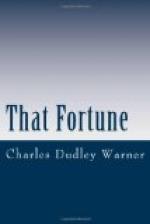“Stuff!” said Mr. Sharp. “If you begin by declining causes you disapprove of, the public will end by letting you alone in your self-conceited squeamishness. It’s human nature you’ve got to deal with, not theories about law and justice. I tell you that men like litigation. They want to have it out with somebody. And it is better than fisticuffs.”
From Mr. Hunt, who moved in the serener upper currents of the law, Philip got more satisfaction.
“Of course, Mr. Burnett, there are miserable squabbles in the law practice, and contemptible pettifoggers and knaves, and men who will sell themselves for any dirty work, as there are in most professions and occupations, but the profession could not exist for a day if it was not on the whole on the side of law and order and justice.
“No doubt it needs from time to time criticism and reformation. So does the church. You look at the characters of the really great lawyers! And there is another thing. In dealing with the cases of our complex life, there is no accomplishment, no learning in science, art, or literature, that the successful practitioner will not find it very advantageous to possess. And a lawyer will never be eminent who has not imagination.”
Philip thought he had a very good chance of exercising his imagination in the sky chamber where he slept—a capital situation from which to observe the world. There could not have been an uglier view created—a shapeless mass of brick and stone and painted wood, a collected, towering monstrosity of rectangular and inharmonious lines, a realized dream of hideousness—but for the splendid sky, always changing and doing all that was possible in the gleams and shadows and the glowing colors of morning and evening to soften the ambitious work of man; but for the wide horizon, with patches of green shores and verdant flats washed by the kindly tide; but for the Highlands and Staten Island, the gateway to the ocean; but for the great river and the mighty bay shimmering and twinkling and often iridescent, and the animated life of sails and steamers, the leviathans of commerce and the playthings of pleasure, and the beetle-like, monstrous ferry-boats that pushed their noses through all the confusion, like intelligent, business-like saurians that knew how to keep an appointed line by a clumsy courtesy of apparent yielding. Yes, there was life enough in all this, and inspiration, if one only knew what to be inspired about.




